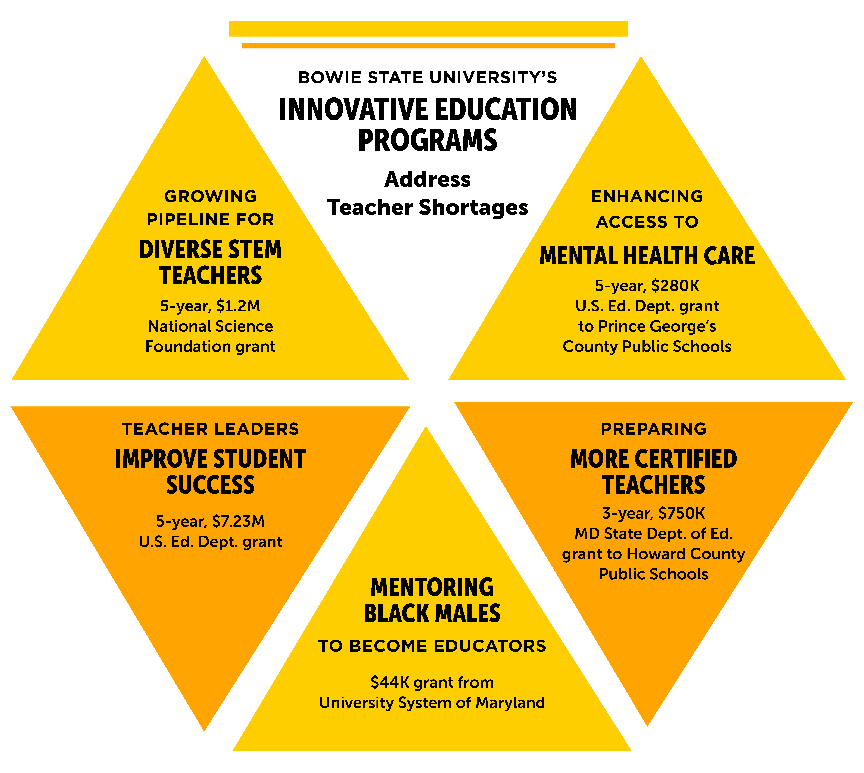Annual Report 2019-2020
Partnerships Expand Programs' Impact
Partnerships Expand Impact of Education Programs
Change doesn’t just happen, especially not in education, where children of color confront systemic inequities. Instead, change is facilitated by the passion and tenacity of educators who, along with administrators and parents, invest in its implementation and sustainability. As an institution of change, Bowie State University has advanced a legacy of strategic partnerships to prepare culturally and professionally trained teachers to equalize education in urban, hard-to-staff districts. In the 2019-20 fiscal year, Bowie State initiated five grant-funded partnerships with local school districts to help address the educational and mental health needs of students in those communities.
In Baltimore City, nine out of 10 Black boys are not reading at grade level. In Prince George’s County, the second largest school district in Maryland, Hispanic students academically score 2.2 grades behind White peers. And in Washington, DC, only 11% of the city’s 4- and 5-star schools are in predominantly Black communities.
The statistics are not new but the approach to remedy them is, led by Bowie State changemakers committed to fixing what’s broken. With funding from a five-year, $7.23 million U.S. Department of Education grant, BSU has launched the STAR Program to graduate 100 new teachers from the university's Master of Arts in Teaching degree program—some recent college graduates, some career-changing professionals—and dispatch them to local classrooms in Washington, DC and Prince George’s and Dorchester counties.
“We’ve been thinking about what it means to improve student learning through the expertise of teachers and the opportunity for them to become teacher leaders. When you do that, you professionalize the profession. Teachers have the opportunity to put solutions in place,” said Dr. Wil Parker, chair of the Department of Educational Leadership, adding that the master’s program equips educators to approach problems based on the specific needs of their students.
In Howard County Public Schools, a BSU partnership program called Paraeducators Pathways to Culturally Responsive Teaching will award 32 teachers’ assistants full scholarships to complete a bachelor’s degree in education at Bowie State. Funded by a three-year, $750,000 grant from the Maryland State Department of Education, recipients will additionally receive specialized training to effectively lead and engage with diverse classes.
And to encourage more STEM-loving students to become teachers and make their passion contagious, Bowie State was awarded a five-year, nearly $1.2 million Robert Noyce Teacher Scholarship Program grant from the National Science Foundation to recruit, train and mentor Bowie State students with a passion for natural sciences and mathematics to become future STEM teachers. Twenty-seven scholars will become instructors in Prince George’s County Public Schools over five years.
Although there’s an all-around shortage of qualified teachers, there’s a special need for Black men in classrooms. It’s a special interest for Dr. Julius Davis, winner of the prestigious Wilson H. Elkins Professorship, who launched the Center for Research and Mentoring of Black Male Students and Teachers and dedicated his $44,000 award to supporting scholars. He hopes the initiative will support Black male high school students interested in pursuing a career in education.
“It’s really about bridging the research, theory and practice gap. I really want to impact what’s going on where it matters to the people most. As we’re trying to develop more Black males in education and in STEM fields, they need to see more people who look like them,” said Davis. “I hope that it will create a national reputation for Bowie State to be a center for excellence for looking at Black male students and Black male teachers.”
Improving Schools' Mental Health Resources
As Bowie State fortifies partnerships with local districts to build the teacher workforce, in-school mental health resources are an equally necessary student support. Mental, behavioral and developmental disorders begin in early childhood and change with age; some like depression and anxiety can become more prevalent over time. More than 20 percent of young people experience diagnosable mental health problems but not enough are getting appropriate intervention, says Nikki Ham, field placement coordinator for BSU’s school counseling program.
“School is a level playing field — everybody comes though the school door. It’s critical that our school counselors not only know how to help children in the academic component, but also know how to identify mental health challenges students may be experiencing and work with the families to get them the appropriate resources,” she explained. With a $280,000 U.S. Department of Education grant, Bowie State is collaborating with the University of Maryland and Prince George’s County Public Schools to train 25 aspiring counselors to support high-needs schools and student’s holistic well-being.
According to the Center for Comprehensive School Reform and Improvement, school districts that prepare children to thrive share four fundamental commonalities: quality teaching and learning, effective leadership, support for system-wide improvement and clear and collaborative relationships. Bowie State students, faculty and administrators are committed to nurturing partnerships that move solutions from concept to hope to real-life actuality.
Next article: New Degree Programs
Browse Sections
President’s Letter Academics & Research Excellence Innovation in Teaching Celebrating Student Success
Donor Honor RollFinancials (PDF) Administration
